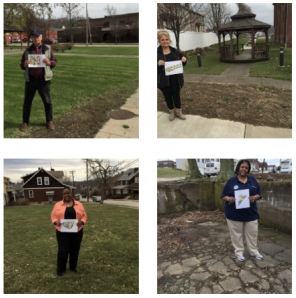How can we foster positive changes in communities that have a history of disinvestment? Part of the solution relies upon grass-roots groups and individuals who are trying to improve their neighborhood. By living or working there, they know what are the needs, what project should be run. And the obstacle they face to implement changes is often a lack of money. To overcome this barrier, ioby is bringing the tool of crowdfunding to citizen leaders.
For the past 10 years, the organization has enabled 675 projects to be funded. Funded projects are all for the public good and go from placemaking initiatives to community gardens, compost projects and pop-up festivals.
In discussing with Katie Lorah, communications and creative strategy director at ioby, she described her organization as a hybrid of an online technical platform and a community-based non profit organization.

Contrary to standard crowdfunding sites like Kickstarter, Indiegogo or Ulule, ioby is not just existing online. To be useful to communities that don’t have many options in terms of funding, it relies on more « grassroots tactics ».
First, ioby walks through each grass-roots organization – run by volunteers or citizen leader – individually to get them to the point they are able to mobilize around their project: How much money do I need? How do I mobilize my network? What is the value of good pictures? How about organizing an event? According to Katie, this service they built on top of the platform is surely time intensive, but is fundamental to drive citizen-led projects to success.
Secondly, ioby employees, most of whom have a background in activism, work deliberately in certain cities like Brooklyn, Memphis, Cleveland or Detroit – where they’ve just opened offices couple of months ago. They are also used to partnering up with local organizations in cities where they don’t have employees to catalyze citizen engagement.

A good example of this type of partnership is the campaign they launched with GTECH Strategies in Pittsburgh to help citizens reclaim, repurpose, and reenergize vacant lots.
GTECH communications manager, Sara Innamorato, declared that “ioby’s doing a great thing in marrying grassroots efforts and traditional community outreach with technology, and bringing it into a new age. Getting a new group of young people involved in it. »
Some progressive city agencies also call on ioby to align citizen leadership with city-wide goals. Such is the case of Los Angeles Mayor’s Office which launched the Great Streets Challenge on ioby’s platform in October 2013 to help transform 15 underutilized commercial corridors into dynamic and safe places. 94 local organizations participated in the process, many partnering together on applications to create a unified community vision for their street.

Connect the Dots, one of the Great Streets Challenge Grant’s winner
After being awarded up to $20,000, the eight winners of the Great Streets Challenge Grant worked with ioby to raise additional funds. And every additional dollar raised was matched dollar-for-dollar by Los Angeles Mayor’s Office. This match-funding really sweetens the deal for local organizations, though representing a small amount for a city.
Obviously, I had to ask Katie if it was not the role of local governments to improve urban environment through public budgets and citizens’ taxes. Isn’t it unfair to encourage communities that have been neglected to invest time and money to revitalize their neighborhood themselves?
First Katie pointed that when we look at what is generally funded, it’s not basic services or infrastructures. Indeed, the average ioby project budget is just over $4,000 and it is largely things that would have been funded by philanthropy. Except that foundations struggle to evaluate which budget is needed and what should be implemented to create improvements in a particular neighborhood. And even when grants are available, for their part, grass-roots organizations do not have often the resource or competencies to apply for the funding.
On this endlessly interesting topic, Katie wrote an article on Planetizen that I suggest you to read.
Among the arguments in favour of civic crowdfunding, she brings up its impact beyond the money raised. « Even if is is just 5 dollars you pay towards creating something in your neighborhood, are you not more likely to feel the connection with the place you live and the collectivity you live with? » asks Katie.
This sense of investment created through civic crowdfunding has also been discussed by Voor je Buurt (literally ‘For your Neighbourhood’), a crowdfunding platform for civic projects in The Netherlands.
« Civic crowdfunding is a very effective way to build active and involved communities around a project. For most civic projects, a strong community is equally important for the success as the funding that is needed. » said Aster van Tilburg in her talk at the Crowdsourcing Week.
To contribute further to build resilient communities, ioby’s team is currently exploring ways to strengthen the network of civic leaders as well as efficient methods to share the knowledge coming from the passed successful projects such as « What are the steps requested to implement a community garden? » or « How I can engage my neighbors to paint a mural? ».
